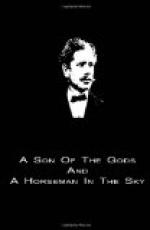The sleeping sentinel in the clump of laurel was a young Virginian named Carter Druse. He was the son of wealthy parents, an only child, and had known such ease and cultivation and high living as wealth and taste were able to command in the mountain country of Western Virginia. His home was but a few miles from where he now lay. One morning he had risen from the breakfast table and said, quietly but gravely: “Father, a Union regiment has arrived at Grafton. I am going to join it.”
The father lifted his leonine head, looked at the son a moment in silence, and replied: “Well, go, sir, and, whatever may occur, do what you conceive to be your duty. Virginia, to which you are a traitor, must get on without you. Should we both live to the end of the war, we will speak further of the matter. Your mother, as the physician has informed you, is in a most critical condition; at the best, she cannot be with us longer than a few weeks, but that time is precious. It would be better not to disturb her.”
So Carter Druse, bowing reverently to his father, who returned the salute with a stately courtesy which masked a breaking heart, left the home of his childhood to go soldiering. By conscience and courage, by deeds of devotion and daring, he soon commended himself to his fellows and his officers; and it was to these qualities and to some knowledge of the country that he owed his selection for his present perilous duty at the extreme outpost. Nevertheless, fatigue had been stronger than resolution, and he had fallen asleep. What good or bad angel came in a dream to rouse him from his state of crime, who shall say? Without a movement, without a sound, in the profound silence and the languor of the late afternoon, some invisible messenger of fate touched with unsealing finger the eyes of his consciousness — whispered into the ear of his spirit the mysterious awakening word which no human lips ever have spoken, no human memory ever has recalled. He quietly raised his forehead from his arm and looked between the masking stems of the laurels, instinctively closing his right hand about the stock of his rifle.
His first feeling was a keen artistic delight. On a colossal pedestal, the cliff, — motionless at the extreme edge of the capping rock and sharply outlined against the sky, — was an equestrian statue of impressive dignity. The figure of the man sat the figure of the horse, straight and soldierly, but with the repose of a Grecian god carted in the marble which limits the suggestion of activity. The gray costume harmonized with its aerial background; the metal of accoutrement and caparison was softened and subdued by the shadow; the animal’s skin had no points of high light. A carbine, strikingly foreshortened, lay across the pommel of the saddle, kept in place by the right hand grasping it at the “grip”; the left hand, holding the bridle rein, was invisible. In silhouette against the sky, the profile of the horse was cut with the sharpness of a cameo; it looked across the heights of air to the confronting cliffs beyond. The face of the rider, turned slightly away, showed only an outline of temple and beard; he was looking downward to the bottom of the valley. Magnified by its lift against the sky and by the soldier’s testifying sense of the formidableness of a near enemy, the group appeared of heroic, almost colossal, size.




